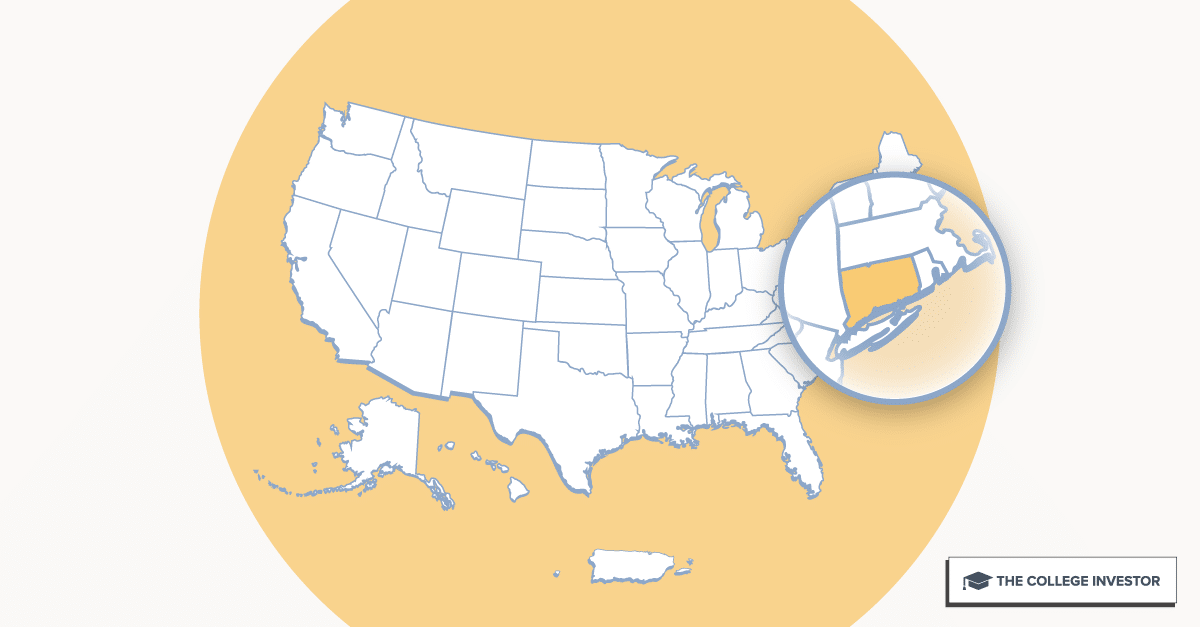Connecticut 529 Plan And College Savings Options

Connecticut has a 529 plan called the Connecticut Higher Education Trust (CHET) that can help you save for college. However, Connecticut is one of the few states that doesn't offer its own 529 ABLE Program.
If you live in Connecticut, these might be good options for you to save for college.
These programs are designed to help make college more affordable - so that you can get the education you need. By saving for college early on, you can make paying for college easier down the road.
If you're not quite sure how 529 plans work, check out this starter guide to What Is a 529 Plan?
There is also a specific order of operations to save for college that we recommend families follow. These programs are specific to the State of Connecticut. Each state has different rules when it comes to 529 plan savings. Here are the Connecticut 529 plan rules.
Average Cost Of College In Connecticut
When saving for college in Connecticut, it's important to take into consideration the cost of attendance in the state. If you choose to go to an out-of-state school, you need to look at the average cost of attendance in that state.
There are 84 colleges and universities in the State of Connecticut.
The total average cost of college (Cost of Attendance) in Connecticut for in-state residents is $25,585 for 2023. This includes tuition, room and board, books and supplies, and other expenses.
For just tuition alone, the average undergraduate tuition for in-state residents is $8,990 for 2023. The cost of tuition in Connecticut has been rising at about 6% per year.
See how this compares to the average cost of college here. Keep in mind the average student loan debt by graduating class here.
Connecticut 529 Plan Tax Information
Tax savings is one of the big benefits of using a 529 plan to save for college. On a federal-level, there is no tax savings for contributions, but qualified distributions are tax-free.
Here are the special tax benefits and considerations for using a 529 plan in Connecticut.
Contributions
Connecticut offers a state tax deduction for contributions to a Connecticut 529 plan of up to $5,000 for single filers and $10,000 for married filing jointly tax filers. You can deduct excess contributions for 5 years (i.e. you can superfund your 529 plan).
Matching Contributions: The CHET Baby Scholars provides a one-time $100 contribution to families that open an account by an eligible child's first birthday or within the first year after an adoption.
Minimum: $0
Maximum: Accepts contributions until all account balances for the same beneficiary reach $550,000.
Rollovers
Rollovers into the state plan are allowed, but not eligible for the state tax deduction.
Outbound rollovers follow federal guidelines.
Qualified Distributions
Qualified distributions from Connecticut and non-Connecticut 529 plans are exempt.
K-12 Education
Connecticut does conform with Federal law in regard to using a 529 plan for K-12 tuition. See this guide: Using a 529 Plan For Elementary and High School Private Education.
Student Loans
Connecticut does conform with Federal law for using a 529 plan for student loans.
Rollover To Roth IRA
Connecticut does not allow the rollover to a Roth IRA up to $35,000. Learn more about the 529 plan to Roth IRA rollover here.
Non-Qualified Distributions Taxes, Penalties, Recapture
A non-qualified withdrawal from a Connecticut 529 plan made to the account beneficiary are exempt from state taxes.
Connecticut 529 College Savings Plan Options
Connecticut has two 529 plan options - one consumer plan and one plan that is sold by financial advisors (we're big advocates of doing-it-yourself, you don't need to pay a financial advisor for this). They also have an old pre-paid tuition program that is no longer taking new enrollment.
Connecticut 529 Plan Facts
Connecticut has the following currently invested in 529 plans in the state as of December 31, 2023:
529 Plan | Number Of Accounts | Total Assets | Average Account Balance |
|---|---|---|---|
Connecticut Higher Education Trust (CHET) | 166,830 | $4,522,433,982 | $27,108 |
CHET Advisor | 33,801 | $911,684,978 | $26,972 |
Total | 200,631 | $5,434,118,960 | $27,085 |
Connecticut Higher Education Trust (CHET)
The Connecticut Higher Education Trust (CHET) is the name of Connecticut's 529 Plan. This plan offers a variety of investment options, including age-based portfolios that become more conservative as the child approaches college, and static investment fund options.
The funds offered include Fidelity.
Check out the Connecticut 529 Plan here >>
Fees:
There is a program management fee of 0.12%.
The underlying funds all charge expense ratios from 0.05% to 0.95% depending on the investment option.
Who Should Use It:
We recommend that Connecticut residents use the Connecticut Higher Education Trust (CHET) 529 plan due to the tax benefits, low fees, and plan investment options.
We recommend that out-of-state residents utilize other plans.
Connecticut 529 Able Plan Options
529A Able accounts are accounts designed to help those with disabilities escape poverty and save for themselves. Learn more about 529A Able Plans here.
Connecticut is one of the few states that does not offer their own ABLE account.
Other Programs To Save For College
A 529 plan is one way to save for college. Remember, we have a full guide on our approach to college savings here - and it helps you find other options.
If you're looking for ways to boost your college savings, check this out:
Backer
Backer is one of our favorite ways to save for college because they make gifting for college so easy. You can setup an account, link your 529 plan (in most states), and get a unique URL that you can share with friends and family to save for your children's college.
Plus, they have Backer Bucks, which allow you to earn rewards and rebates for the shopping you already do - directly deposited into your children's 529 plan.
Upromise
Upromise is another awesome tool to help you save for college because they have a lot of ways that you can earn money for your 529 plan. You can get rebates and rewards, and you can get cash back into your child's 529 plan by using the Upromise credit card.
Connecticut Financial Aid
Using a 529 plan isn't the only way to save money for college. Each state typically offers a variety of financial aid programs for their residents. These include scholarships and grants, and sometimes unique forgivable student loan opportunities.
Check out the list of Connecticut Student Loan and Financial Aid Programs.
Return to the full list of 529 Plans By State.
Editor: Clint Proctor Reviewed by: Chris Muller
